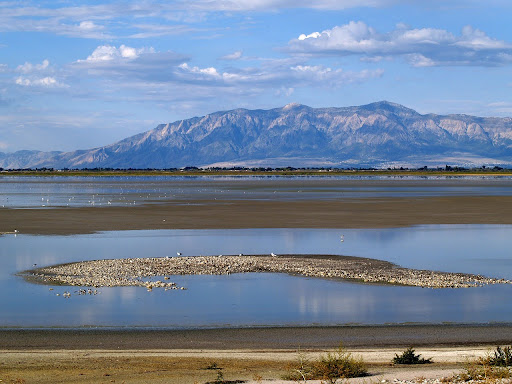Restoring the Great Salt Lake would have environmental justice benefits
The drying of the Great Salt Lake is releasing harmful dust to the surrounding Salt Lake Valley. But are some people more likely to suffer harmful consequences from increasing dust exposure? ESS faculty Sara Grineski and Tim Collins sought to answer this question through an environmental justice lens.
Their team’s research examined how dust pollution changes based on lake levels and
whether exposure changes with racial/ethnic or socioeconomic status. Their findings
showed that dust exposure is highest in Pacific Islander and Hispanic people, and
also higher in people without a high school diploma. 
Grineski hopes these findings will encourage policymakers to prioritize restoring the Great Salt Lake to a healthy level. “If we were to enact policy and conservation measures to raise the lake, we would benefit not only in terms of decreased dust, but in terms of less dramatic disparities between who is breathing in more of this dust,” says Grineski. “It’s important to consider the environmental justice implications of different choices that we might make in the policy arena when we think about different strategies for adaptation and mitigation to climate change.”
Their research is featured in the journal OneEarth.
About the Blog
Discussion channel for insightful chat about our events, news, and activities.
Categories
Featured Posts
Tag Cloud
- School of Environment Society and Sustainability (18)
- research (6)
- urban tree (1)
- paleoecology (1)
- sustainability (3)
- ethnobotany (1)
- cel (1)
- faculty research (4)
- UAP (1)
- student research (1)
- field research (1)
- open house (1)
- climate grief (1)
- award (2)
- field trip (1)
- organic farming (1)
- political ecology (1)
- taft nicholson center (1)
- writing retreat (1)
- Southeast Asia (1)
- wildfire (1)
- Climate change (2)
- Environmental Justice (2)
- Great Salt Lake (1)
- Dust (1)
- Faculty research (3)
- Job posting (1)
- Data science (1)
- Climate Change (1)
- Rivers and Streams (1)
- Geology (1)
- Faculty Research (1)
- Green spaces (1)
- Invasive species (1)
- Forest ecology (1)
- Utah wildlife (1)
- water security (1)
- renewable energy (1)
- climate change (1)
- economic development (1)
